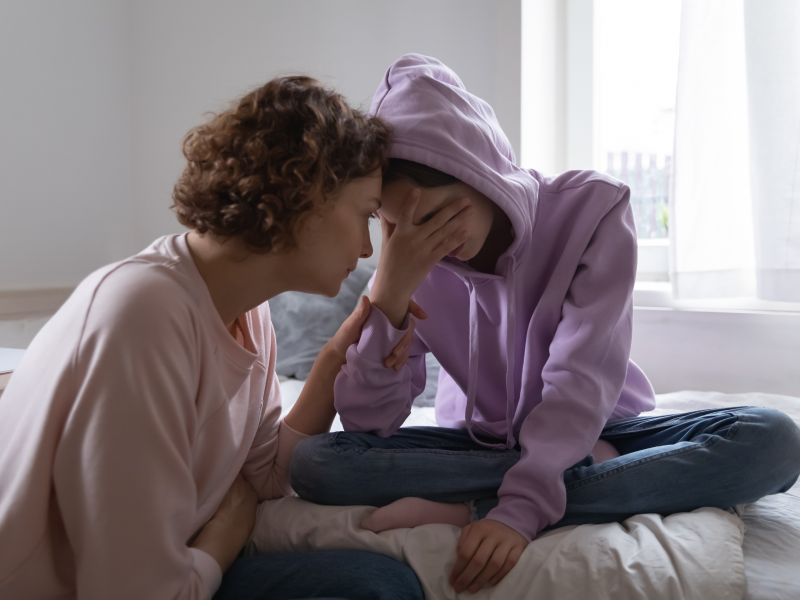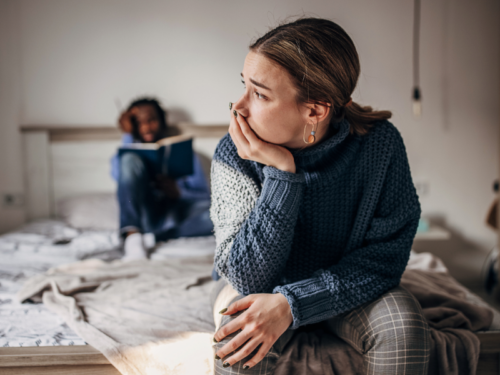
Table of Contents
How Does Depression Affect Relationships?

Written By: Alex Bachert, MPH

Clinically Reviewed By: Dr. Don Gasparini
March 7, 2023
6 min.
Learn how to maintain healthy relationships while living with depression.
Learn more about our Clinical Review Process
Table of Contents
How does depression affect relationships?
Depression is a mental health condition defined by persistent feelings of sadness that are severe enough to affect the way a person thinks, feels, and acts. Depression in teens has been linked to drug and alcohol abuse, as well as an increased risk for suicidal thoughts and behaviors. When left untreated, depression can cause problems at school, work, and home and exacerbate other mental health issues.
Unfortunately, depression can also take a toll on your relationships. Our teenage and young adult years are typically a time to grow friendships, explore romantic relationships, and better understand our identity and role in the world. When a person is unable to pursue healthy relationships with their peers, parents, teachers, and role models, they may be missing out on key moments and milestones.
Below, we list several ways that depression can impact a person’s mental health and relationships.
Untreated depression is linked to isolation
When feeling down, sometimes all you want is to be alone. For people suffering from depression, that desire for isolation can be even more pronounced. Recent research shows a clear connection between social isolation and an increased likelihood of anxiety and depression in teens. When a person’s depression goes untreated, the more difficult it can become to interact with other people—even those you love most.
Untreated depression can hurt your self-esteem
Difficulty making decisions, low self-esteem, and feelings of worthlessness are all depression symptoms and signs. Because of this, young people who are depressed might be more vulnerable to criticism and rejection. When you’re not feeling your best or confident in who you are, it can be difficult to find the motivation to show up for others.
Untreated depression can hold you back
Depression doesn’t care if you’re the captain of your soccer team or the lead in your school play. Depression sometimes doesn’t even care if a loved one is reaching out to support you or if your romantic relationship is suffering because of depression symptoms. Depressive episodes can occur at any time—even if you were just excited about a first date or participating in an upcoming debate. Losing interest or pleasure in things you used to enjoy are both signs of depression, but for people who don’t know, it may seem like you’re blowing them off or ignoring your responsibilities.
Untreated depression can cause tension
Teenagers with depression are known to spend less time socializing with friends. Sometimes, depression can even lead people to start hanging out with a new crowd or engaging in risky behaviors. Depression can also create friction between teens and their parents, especially when parents become frustrated about not knowing how to help.
Join the Charlie Health Library
Get mental health updates, research, insights, and resources directly to your inbox.
You can unsubscribe anytime.
Tips for building healthier relationships
It’s hard to feel like a good friend when you’re dealing with a depressive episode, but finding ways to connect during tough moments can actually strengthen those relationships. In fact, research shows that social support can play a key role in both preventing and treating mental health symptoms during the transition from adolescence to young adulthood.
If you notice yourself withdrawing from family and friends or no longer finding joy in your social activities, there are steps you can take to continue to nurture your relationships.
Be open about your struggles
When we’re feeling down or distant, it’s often easier to shut people out rather than explain what’s going on. It might not be fun, but finding the strength to share your mental health struggles will ultimately help strengthen your relationships and help your loved ones to be more supportive.
Not sure how to get started? Here are a few tips:
- Tell your friend or family member that you have something to share and schedule a time to meet. This gives you both time to prepare for the conversation.
- Your mental health is yours to talk about, so offer as much or as little information as you want. If you’re not ready to share all the details, you can simply say "I'm having a tough time right now. I'm not ready to speak about my depression yet but I appreciate your support.”
- There’s no way to know the other person’s reaction, but there’s a good chance your family and friends will want to help. Whether it's a hug or help telling other people, leaning on your friends is an opportunity to build healthier relationships.

Discover your relationship sweet spot
When going through a depressive episode, you might not feel up for grabbing a pizza after practice or meeting your friend for a movie—and that’s ok! Instead, find ways to connect that help you to maintain your social connections while coping with your symptoms. For example, texts and emails are low-pressure ways to stay in touch. You can also suggest plans based on the times and places you feel your best.
Join an online community
Virtual mental health support groups can be a powerful way to learn coping techniques and connect with other people living with depression. Some research suggests that participating in online depression support groups can help reduce symptoms and self-stigma. It’s also a way to build new relationships. The National Alliance on Mental Illness (NAMI) offers great resources for teens and their families who are learning how to manage depression.
Show compassion for yourself
Remember that the most important relationship in your life is with yourself. When you take care of your mental, physical, and emotional health, you're better equipped to share your best self with others when you feel ready.
What else should I know about depression?
There are several types of depression, but major depression—also known as major depressive disorder—is currently one of the most common mental health disorders impacting teens and young adults in the United States. According to the National Institute of Mental Health, approximately 4.1 million adolescents ages 12-17 years (17 percent of that age group in the U.S.) experienced at least one major depressive episode in 2020.
Major depression looks a little different for each person, but an official diagnosis requires five or more of the following symptoms on most days for at least two weeks.
- Persistent sad, anxious, or depressed mood
- Loss of interest in hobbies and activities
- Change in weight or appetite
- Trouble sleeping
- Irritability
- Tiredness, fatigue, or low energy
- Feelings of guilt, worthlessness, or helplessness
- Difficulty concentrating, remembering, or making decisions
- Suicidal thoughts or behaviors
Other types of depressive disorders that affect teens and young adults include seasonal affective disorder (SAD), persistent depressive disorder (PDD), bipolar depression, and premenstrual dysphoric disorder (PMDD).
How can I treat my depression?
There’s no question that living with depression can take a major toll on your relationships, including your relationship with yourself. The good news is that depression is treatable with access to therapy, psychiatric medications, and healthy lifestyle choices. In fact, the American Psychiatric Association reports that more than 80 percent of people with depression eventually feel better once they’ve started treatment.
Do you need more support with
your mental health?
Charlie Health can help.
Treatment for depression is specific to each person’s diagnosis, symptoms, and preferences, but some of the leading treatment options include:
- Individual therapy
- Group therapy
- Medication
- Mindfulness techniques
- Lifestyle changes
Treat your depression with Charlie Health
Charlie Health helps teens and young adults navigate depression and other mental health challenges in a safe, supportive environment. With our virtual intensive outpatient program (IOP), teens, young adults, and their family members can experience the benefits of in-person therapy from the comfort of their homes.
Our team of compassionate clinicians are here to support you every step of the way. Taking that first step can feel overwhelming, but getting the help you need will make life so much brighter. Learn more today.
References
https://www.nimh.nih.gov/health/statistics/major-depression
https://www.nimh.nih.gov/health/topics/depression
https://opa.hhs.gov/adolescent-health/healthy-relationships-adolescence
https://www.ncbi.nlm.nih.gov/pmc/articles/PMC8543788/
https://jamanetwork.com/journals/jamanetworkopen/fullarticle/2773539
https://www.nami.org/Your-Journey/Individuals-with-Mental-Illness/Disclosing-to-Others
https://journals.sagepub.com/doi/10.1177/2158244015574936
https://www.nami.org/Support-Education/Support-Groups
https://www.psychiatry.org/patients-families/depression/what-is-depression





